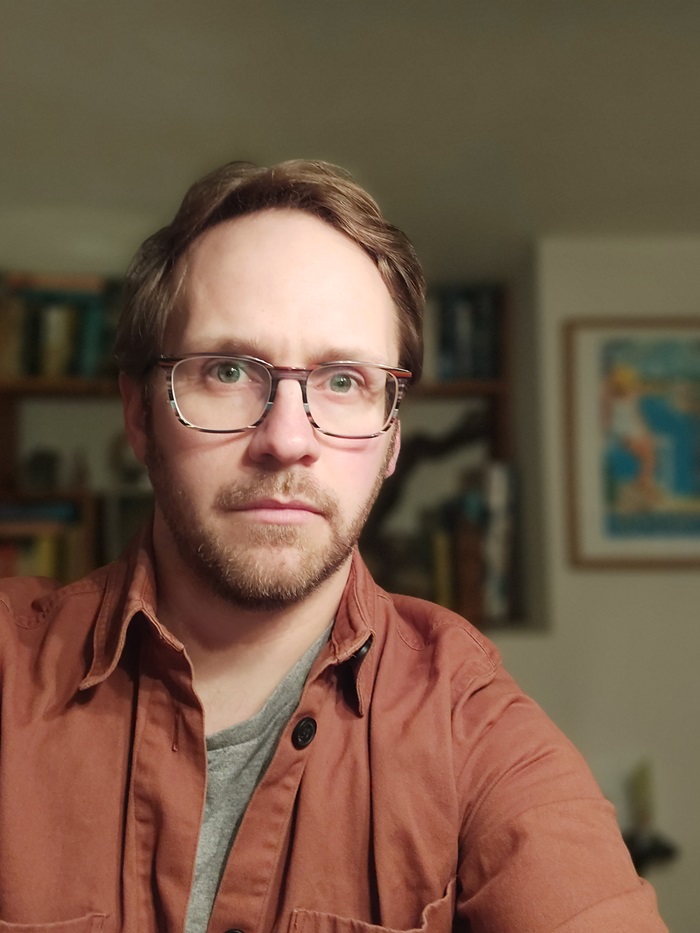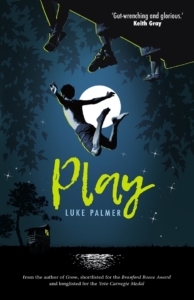
A Q&A Interview with Luke Palmer
Luke Palmer already has two well received books to his name, Grow, which was shortlisted for the Branford Boase Award, and Play, which is shortlisted for the Carnegie Medal for Writing. Now comes a third novel, Live, which also deals with contemporary issues and, like his earlier books, is realistic, direct, and filled with understanding of young people today. Thanks to Luke for answering our questions about his book.
Live is a book about young musicians. Can you explain the importance of music to you growing up? How did that shape this book?
 Music was everything when I was growing up. My parents’ house was always full of music, and my dad was the one who first put a guitar in my hands. He plays, too. As do all my siblings. My brother is particularly gifted. He’s the kind of person you can give any instrument, and an hour or so later he’ll have mastered it. My teenage years were all about passing a guitar around on the beach or at parties, or it was our band or one of our friends’ bands playing in a dingy upstairs room at a pub and everyone being there, dancing, falling in love, falling out of love…. Music was our social glue; it gave us something to talk about, to learn about, to explore. It was the freedom that we were all yearning for. Playing guitar gave me a group and a purpose and helped shaped my identity massively (and it’s one of the reasons my wife says she fell in love with me, so I kind of owe it a lot in return!)
Music was everything when I was growing up. My parents’ house was always full of music, and my dad was the one who first put a guitar in my hands. He plays, too. As do all my siblings. My brother is particularly gifted. He’s the kind of person you can give any instrument, and an hour or so later he’ll have mastered it. My teenage years were all about passing a guitar around on the beach or at parties, or it was our band or one of our friends’ bands playing in a dingy upstairs room at a pub and everyone being there, dancing, falling in love, falling out of love…. Music was our social glue; it gave us something to talk about, to learn about, to explore. It was the freedom that we were all yearning for. Playing guitar gave me a group and a purpose and helped shaped my identity massively (and it’s one of the reasons my wife says she fell in love with me, so I kind of owe it a lot in return!)
You write about adolescent boys and young men. What’s the appeal of this demographic for you as a writer and does it come with any particular responsibilities?
Boys aren’t getting much good press at the moment, and in many cases there’s good reason for that. I don’t think the ‘not all men’ argument holds a huge amount of water, but the vast majority of young men that I’ve ever known are brilliant people, and they’re worried about the future and their place within it, as men. There’s a lot of pressure on them, but I think young men are awesome and I hope my books celebrate that. I also think the popular press would have you believe that adolescent boys are confident and cocky and that they think they know it all, but that’s a long way from my experience. Some are, of course, but for many it’s just a front. Most of them are looking for guidance; for a steer towards the kind of men they want to be or that it’s possible to be. I don’t think we father young men enough. There’s a reason the toxic influencers pick up so many followers, because they’re exploiting a gap. There’s more to say on this, but in short I think fiction is the perfect place to provide that alternative to the toxic influencers; it’s a space to allow young men to explore safely where certain behaviours might lead, rather than doing it online which does have real world consequences.
You also seem drawn to write about quite dark subjects and there are themes of grief and loss in Live. What makes you do this and again, are there considerations to bear in mind when tackling the sorts of subjects you cover?
My primary consideration is to my characters. I write as an act of empathy and, though it sounds strange, I very much take their feelings into  consideration. So if I’m putting a character through a bad time (which I often do), I try not to do it exploitatively. I’d like to think I treat their journeys and their actions with kindness and try to meet them where they are. Whenever I’ve spoken to readers who have a lived experience of something I’ve put into one of my books, they generally say they appreciated the nuance with which I dealt with it and how I made it feel real. And that’s the best kind of feedback. I use dark subjects in my books because that’s where the extremes of emotion are. And working at the extremes is where you push into new emotional ground. It’s important to me that my characters grow and change through my books, and I seem drawn back again and again to the arena of grief as a place to do that. And also because they’re real themes. Grief will affect us all at some point in our lives. And the other topics I write about – in Live, things like consent, porn addiction, mental health – they’re all real, too. They’re part of the fabric that makes up young people’s lives nowadays.
consideration. So if I’m putting a character through a bad time (which I often do), I try not to do it exploitatively. I’d like to think I treat their journeys and their actions with kindness and try to meet them where they are. Whenever I’ve spoken to readers who have a lived experience of something I’ve put into one of my books, they generally say they appreciated the nuance with which I dealt with it and how I made it feel real. And that’s the best kind of feedback. I use dark subjects in my books because that’s where the extremes of emotion are. And working at the extremes is where you push into new emotional ground. It’s important to me that my characters grow and change through my books, and I seem drawn back again and again to the arena of grief as a place to do that. And also because they’re real themes. Grief will affect us all at some point in our lives. And the other topics I write about – in Live, things like consent, porn addiction, mental health – they’re all real, too. They’re part of the fabric that makes up young people’s lives nowadays.
Why do you like writing for a YA audience? What are the particular challenges and satisfactions of that?
I’m surrounded by young adults every day, and I find their company (mostly!) invigorating and highly stimulating. They’re discovering the world for the first time, and that’s an amazing energy to be around. It helps keep me curious and questioning, too – a mindset that I think we could do with more of in the world, if I’m honest!
You write poetry as well as prose. Do they feed into one another, or do they take different parts of your brain?
 They definitely feed into each other. Live is probably the book where I’ve let that ‘poetic’ side of me off the leash the most – the descriptions of music on the one hand, and the exploration of George’s depression on the other. But it’s not just about letting go and waxing on about something. The most important lesson that poetry has taught me is brevity – you’ve got to be economical with your words and do the most you can with the fewest marks on the page. That way, the energy of your prose kicks right up, because every word is carrying weight.
They definitely feed into each other. Live is probably the book where I’ve let that ‘poetic’ side of me off the leash the most – the descriptions of music on the one hand, and the exploration of George’s depression on the other. But it’s not just about letting go and waxing on about something. The most important lesson that poetry has taught me is brevity – you’ve got to be economical with your words and do the most you can with the fewest marks on the page. That way, the energy of your prose kicks right up, because every word is carrying weight.
What is the Desert Island Disc you’d save from the waves?
You know, I’ve written this list in my head so often and I come up with a different answer every time! Because Live comes with three playlists that give the reader an introduction to each character, I’m going to pick from just those. And it’s going to have to be Jeff Buckley’s Lover You Should’ve Come Over from Beth’s playlist. It has everything – lyrics, music, voice, movement, heartbreak, despair, hope, joy. It’s pretty much the perfect song!
Live is published by Firefly Press, 978-1915444967, paperback £9.99





